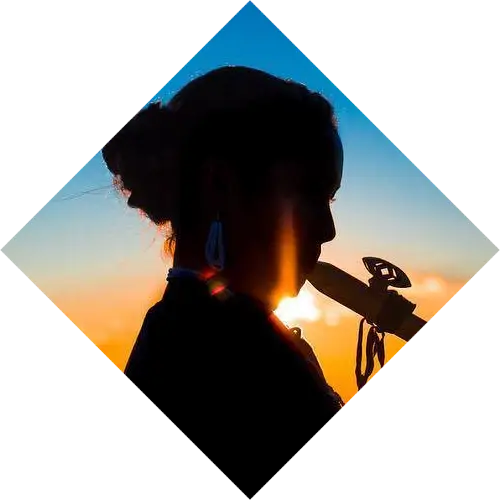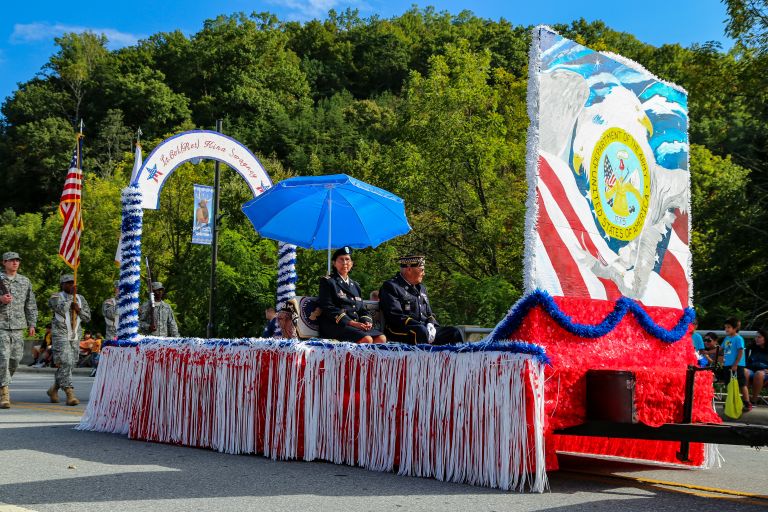
If you do any research on renowned people in Cherokee history, you may have come across the terms Beloved Woman and Beloved Man. You may have even heard wonderful storytelling by the late Beloved Man Jerry Wolfe on one of your previous visits to Cherokee, NC.
Traditionally, the designation has been bestowed upon women and men who have made special and unique contributions to the Cherokee people. Also known as “War Women,” Beloved Women have been carefully selected for their honesty and wisdom. Historically, the title was attributed to women who had protected the Cherokee as warriors. After serving, women returned home to continue their public service.
While there is little recorded information about how long this tradition has taken place, we do know a bit from brief written accounts and depictions on pottery. Anglo-American journalist Henry Timberlake wrote in his 1765 memoirs, “Old warriors likewise, or war-women, who can no longer go to war, but have distinguished themselves in their younger days, have the title of Beloved.” In James Mooney’s accounts, he stated, “among the Cherokee, the final rendering may have been according to the will of the ‘Pretty Woman’ [another name for Beloved Women] herself.”
Women of the Eastern Band of Cherokee Indians are now making contributions in many new ways. Because roles have shifted, so, too, should the definitions of the titles we use to honor Cherokee women and men.
Strengthening Traditions for Future Generations: New Committee Formed to Honor the Contributions of Cherokee People
To help solidify the nomination process, how honorees should be recognized, what they should receive, and to preserve the integrity of the “Beloved” title, the Eastern Band of Cherokee Indians Tribal Council voted unanimously last April to establish a Beloved Women Committee. The resolution was submitted by the North American Indian Women Association, the Museum of the Cherokee Indian and enrolled member Kimberly “Kim” Smith of the Cherokee Civil Actions Team.
Writer and inspiring go-getter, Kim spearheaded resolution efforts as a way to honor her aunt, US Army Lt. Col. Kina Swayney, who passed away in March 2017 and was honored posthumously as a Beloved Woman a year later. After serving in the army for 24 years, Lt. Col. Swayney returned to Cherokee and founded the Cherokee Civil Actions Team to promote ethical leadership in tribal government, combat the drug crisis, and advocate for American Indian rights.
“Even if I wasn’t related to this woman, I would support the efforts to recognize her, her merit alone is unparalleled,” says Kim. “When she came home, she turned a page from being that military warrior to being a community person and dedicated the remainder of her life to promoting programs like the Drug Awareness Walk.” When the idea to nominate Swayney began floating around, Kim began researching the topic. She says she got inspired because of the lack of a modern definition of the term, and she wanted to help promote this wonderful aspect of Cherokee culture.
“There’s been a resurgence of wanting to recognize people for this honor and really there is no formal structure as to how this is done,” she says. “There is limited knowledge on it and in order to preserve the title for those who have already received it, we want to make sure there’s an accuracy and a guide to how somebody can achieve this honor.”
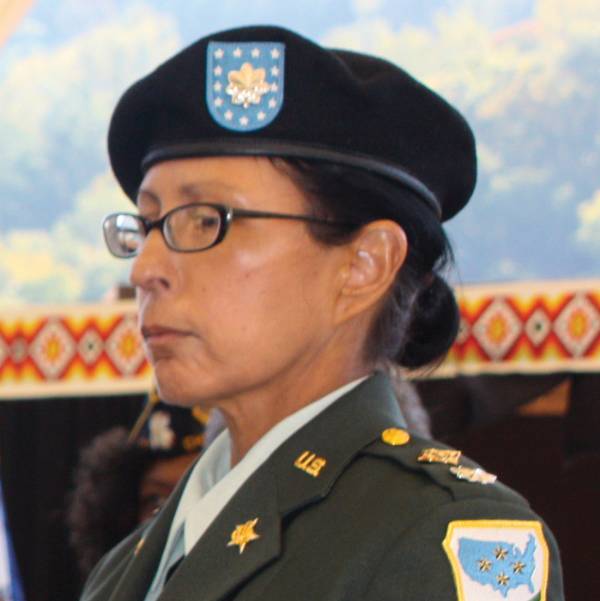
Lt. Col. Kina Swayney
Beloved Men & Women of Recent and Ancient History
“There have been many names given to the same type of woman,” says Kim who met with Dr. Barbara Duncan, Education Director of the Museum of the Cherokee People, last February to collect further research on the topic. They found records dating the term back to around 1765.
Recent Beloved Women & Men
Below are the names of Beloved Women and Men from the past century and the date in which they received the recognition. In parentheses is one of many titles of service they held.
Lula Owl Gloyne (Nurse) – 1943
Maggie Wachacha (Tribal Council clerk) – 1978
Louise Bigmeat Maney (Potter) – 2001 posthumously
Myrtle Driver Johnson (Language Translator) – 2012
Ella Wachacha Bird (Teacher of Traditions to Younger Generations) – 2013
Jerry Wolfe (Storyteller) – 2013
Shirley Oswalt (Director of Education Program) – 2017
Amanda Swimmer (Potter) – February 2018
Kina Swayney (Community Organizer) – March 2018 posthumously
Steve Youngdeer (former Principal Chief) – January 2018
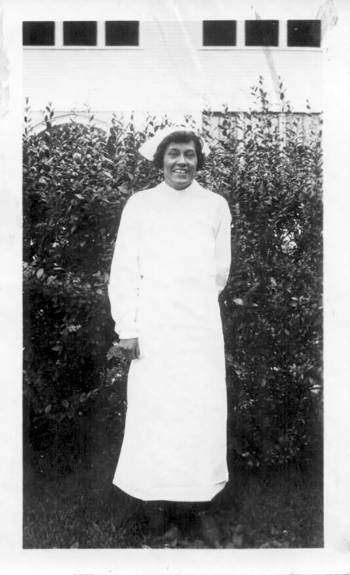
Lula Owl Gloyne
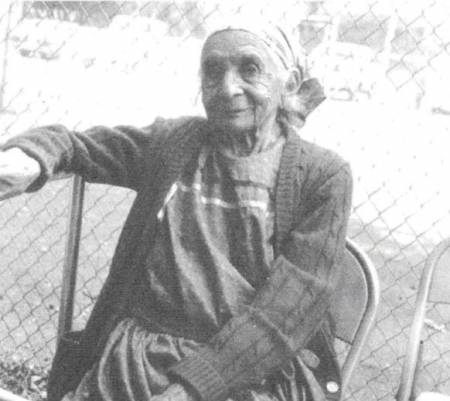
Maggie Wachacha
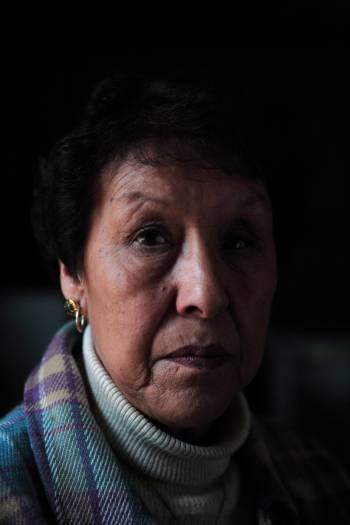
Myrtle Driver Johnson
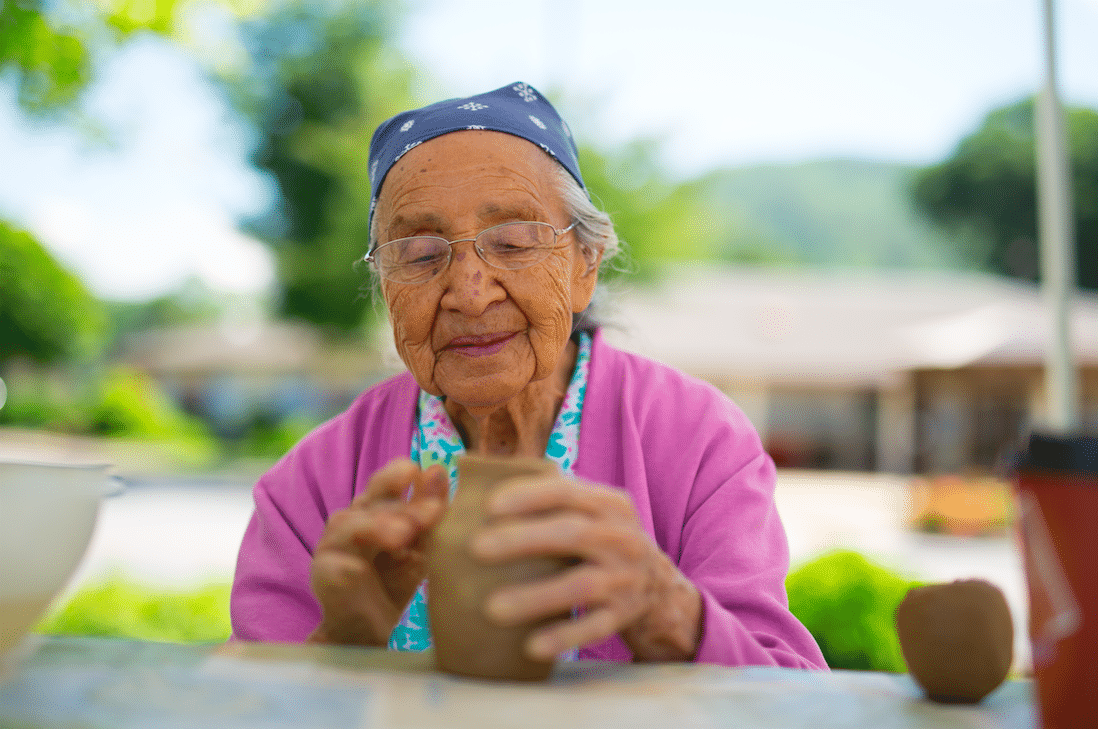
Amanda Swimmer
Traditional Beloved Women and Men
The following are five Beloved Women and Men and the estimated dates or date ranges of when they were recognized with the honor.
Anitiwatsi – date unknown, but likely mid-1800s
Katteuha – range of 1770-1780
Nanyehi (Nancy Ward) – range 1760-1770
Oconostota (Beloved Man) – 1775
Little Turkey (Beloved Man) – Passed away in 1801, but date of recognition is unknown.
There are three living Beloved Women. You may have had the privilege to see Beloved Woman and potter Amanda Swimmer at the annual Pottery Festival. Myrtle Driver Johnson (pictured right), another Beloved Woman, translated E.B. White’s Charlotte’s Web into Cherokee. She has served as Cherokee interpreter for Tribal Council and the New Kituwah Academy. Ella Wachacha Bird has passed down her knowledge of traditional medicines and native foods and sets a wonderful example for young women to emulate.
Steve Youngdeer is the only living Beloved Man of the Eastern Band. After serving in WWII as a US Marine, Youngdeer became an army paratrooper and then a policeman. Youngdeer served as principal chief of EBCI from 1983 to 1987. He was active in the establishment and continuance of the local American Legion Auxiliary Post 143, which was subsequently named after him. Beloved Man and WWII veteran Jeremiah “Jerry” Wolfe passed away in March at the age of 93. Jerry was a very involved and cherished member of the community teaching stickball, getting involved in public service, and helping preserve the Cherokee language.
The Beloved Woman Committee
The Tribal Council passed the resolution on April 5, 2018 that established “a Beloved Women Committee to lead the efforts in defining the contemporary qualifications, roles, and stipulations of the ‘Beloved’ honor.” There are seven communities represented on the Council: Painttown, Wolfetown, Yellowhill, Big Cove, Birdtown, Snowbird, and Robbinsville communities.
The committee will be comprised of one member elected from within Tribal Council, one member appointed by the EBCI Office of the Principal Chief, one member elected from within the North American Indian Women’s Association Cherokee NC chapter, and two outstanding community members, one female and one male, selected by the aforementioned members. (Pictured left, Ella Wachacha Bird and Principal Chief Richard Sneed.)
While the committee members have not yet been selected, an outpouring of support has already started coming in from people in the community. As Kim was leaving the podium at the April council session, she was met by many handshakes. “It was a great day,” she recalls with a smile.
While the title is the Beloved Women Committee, the resolution is written to be inclusive of both genders. “Beloved” was originally only a title for women. “It was meant to acknowledge great women. But of course we have exemplary men in this community who merit the title,” says Kim.
At the same session in April when the Beloved Women Committee resolution passed unanimously, a resolution submitted by Jeremy Wilson, Wolfetown Representative, also passed. It called for the Office of the Principal Chief to designate a Council House lobby wall that will honor all Beloved Men and Beloved Women.
Kim says one of her biggest goals in working on the resolution with other community partners was to help guide people away from saying things like “Oh, my great grandmother was a Cherokee princess.” She believes that promoting the Beloved Women will develop an understanding that there weren’t Cherokee royalty, that leaders can be anyone male or female from within the tribe, who exhibits the “Duyukdvi”, right path, mindset.
While nothing is set in stone until the committee is formed, the brainstorming sessions have already started on what the title could involve. One of the traditional roles of a Beloved Woman was to sit on the Council to offer opinion (but not to cast any votes) and perhaps that will be continued. A garden to honor Beloved Women will hopefully also come to fruition in time for Earth Day 2019.
Inspiring Others to do Amazing Things
For Kim to serve on the committee formally, she would have to be selected as a community member, or an appointed member by the EBCI Office of the Principal Chief. Kim has made it clear that she doesn’t expect to be given a position on the committee. The intent was to have the committee be comprised of the best of the community. If she is appointed, Kim says that it would be a great honor to continue promoting Beloved Women through an official capacity.
Kim’s passion for sharing stories of powerful Cherokee women is evident in everything she does. Separate from the Beloved Women Committee project, Kim is currently writing a children’s book that loosely follows the story of Beloved Woman Katteuha. “Less than 10% of children’s books have a minority female lead character,” she says. “This could be something that could motivate people from many minority communities.”
She hopes that the book will be published and distributed in the near future. “I wanted to figure out a way to highlight the women of the past: how they and their stories have made the women of today. I want something that my girls can read and get excited and passionate about. Something that will feed their appetite for reading, but at the same time give them something they can connect to that will inspire them to do amazing things.”


